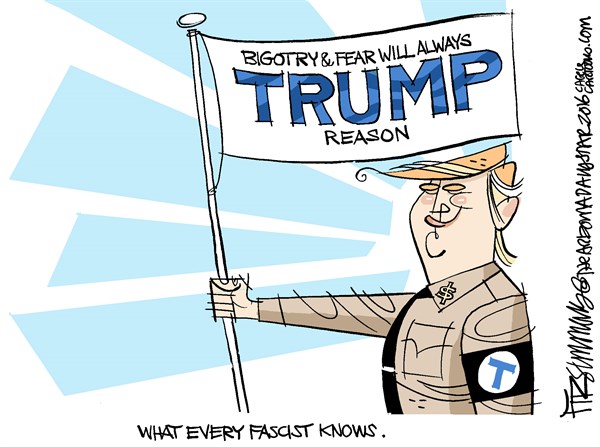
The Republican candidate takes his latest step toward authoritarianism with his refusal to accept a possible electoral defeat. This kind of attitude goes over quite well with his supporters, the many people who harbor anger and disappointment toward traditional politics. It also has the effect of bringing up the conflict between system and anti-system, present in Europe as well.
By refusing to accept the election’s result, Donald Trump takes one last step toward authoritarianism and against democracy. Trump has no “suspense” to spoil. After the last presidential debate and the days of propaganda on “rigged” elections that preceded it, it is evident that, according to the tycoon, the voting process will only be in order if it works in his favor.
Kellyanne Conway, his campaign manager, has also made it clear in a statement that, as usual, turns tragedy into farce. According to her, there is nothing to fear: “Donald Trump will accept the results of the election, because he’s going to win the election.” The irresponsibility of toying like this with the very foundation of democracy, i.e. the acceptance of the rules, seems to bother nobody among Trump’s supporters. Even before the debate, they filled Facebook walls and Twitter with posts that claim that democracy is already nonexistent in practice; that it is “crooked,” like Hillary Clinton and the establishment she stands for.
Saying that there is no difference between a regime and a democracy is an authoritarian habit. However, judging from the enthusiasm online, it goes over quite well with Trump’s target audience, the many people who are disappointed with and angry at traditional politics. The equivalence is false, but the problem is real and terrible. Trump no longer plays at the same level as his rival; the debate is not, if it ever was, between the challengers for a democratic competition. It is between a candidate who is insincere (if the materials published by WikiLeaks are to be believed), sometimes robotic, if one wills, but fundamentally fair; and an aspiring dictator.
The usual war between a liberal and conservative view of the world ceases before Trump’s typically authoritarian rhetoric. As in many European countries, even in the United States, the struggle is between system and anti-system, between politics and anti-politics, the (rather bruised) tradition and an “authoritarian populism” that turns listening to the people into a pretext, a crowbar, to take vested interests apart, along with the legitimacy of existing institutions.
This becomes evident after a review of Trump’s rhetoric and ideology, the collection of proposals, prejudices, lies and boasts that led the most unlikely candidate in history to the threshold of the White House.
These pillars support a political and social view that makes the blood run cold and brings to mind the worst of the previous century: mass deportation based on ethnicity and race; walls that are meant for racial control as well, to keep the Mexicans (“bad hombres”) outside of the border; jailing one’s rival and questioning her very legitimacy to run against him; unbridled militarism with little to no regard for the consequences of an arms race that seems inevitable, considering the tones and unpredictability of the constant attacks in matters of foreign policy; nationalism; paternalism (let’s get rid of abortion, we are “pro-life”); praise for dictators of the caliber of Putin and Assad; exploitation of the fear of the other and the different to justify any kind of repression in matters of national security, including a mysterious button to “clos[e] that internet up”; anti-intellectualism (Trump claims to be the only smart person — the others, the dumb ones, are the current politicians, especially those in the government); self-evident racism that is supported by organized groups belonging to the “alternative right” that Trump never truly distanced himself from; sexism that manifested itself over and over again and was confirmed by that “nasty woman” Trump hissed at Hillary — in doing so, he also interrupted her with the usual brazen attitude of an executive at his company; constant accusations of dishonesty and corruption against the media that, according to Trump, “poison the minds of the American Voter”; intolerance toward satire, like Alec Baldwin’s in Saturday Night Live, a program Trump said should be canceled; finally, an utter, pathological lack of respect for the truth. Some, like Leah McElrath, portray Trump as a molester with narcissistic personality disorder, a definition that is both useful and terrifying.
However, we should be just as concerned about the increasing overlap between Trump and the authoritarian leaders of modern history. What matters more than any evaluation, whether in terms of politics or polls, is the red flag that the third and last presidential debate raises concerning the resilience of the self-defined “greatest democracy” in the world that would have its president be the “leader of the free world.”
This rhetoric has clearly gone stale, as evidenced by the duplicitous actions of candidate Clinton, the person who is most likely to continue and, somehow, to update it. However, that same rhetoric could turn into a nightmare of liberticidal regression in case the media, corrupt or not, truly lost touch with the public opinion and woke up on the dawn of Nov. 9 in a country that defeated democracy because after all, consciously or not, that was exactly the reason why it chose to democratically go to vote.

Leave a Reply
You must be logged in to post a comment.